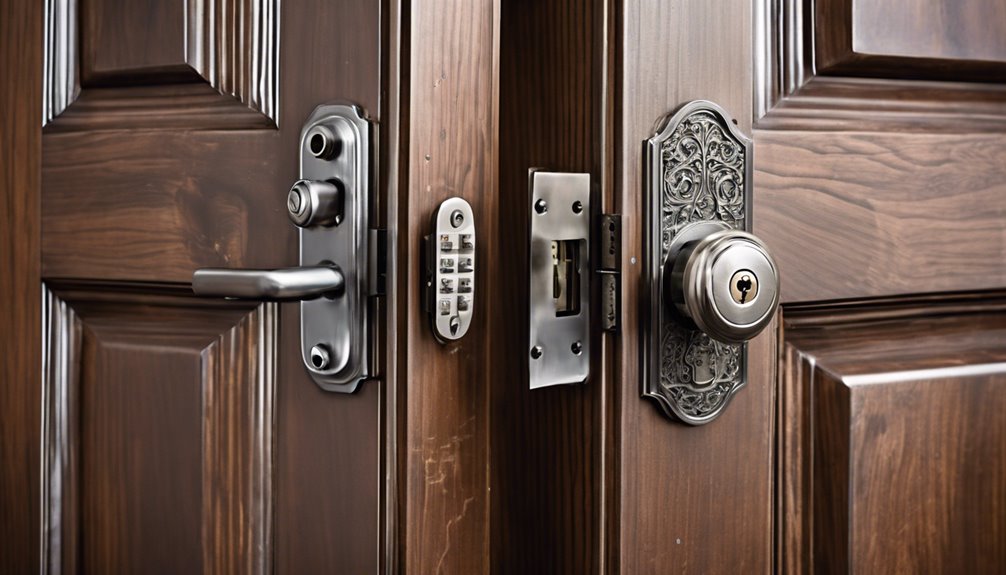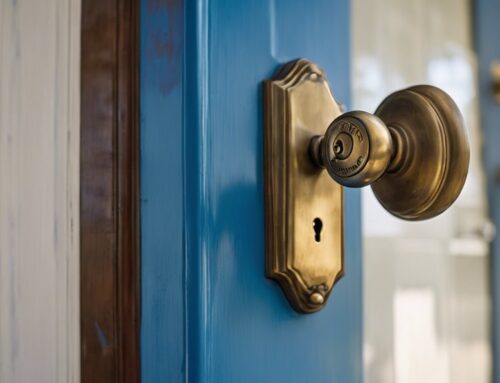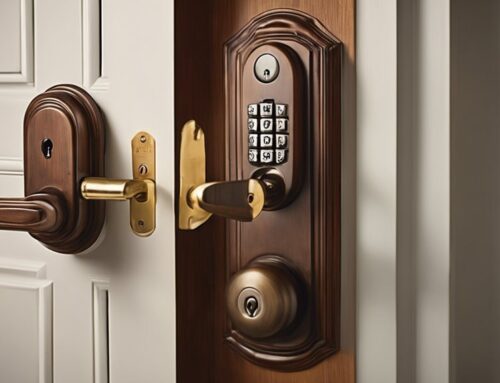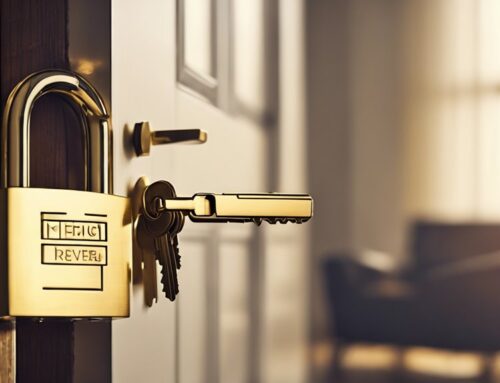You might think that high-security lock regulations are overly complicated, but they're actually designed to enhance safety for everyone in New Jersey. Understanding these standards can lead to better decisions when securing your home or business. There are specific requirements for locks on exterior doors as well as guidelines for locksmith licensing that impact not only individual properties but community safety as a whole. What do these regulations really mean for you and your security choices?
Key Takeaways
- High-security locks in New Jersey must comply with ANSI/BHMA A156.2 standards, with specific grades for heavy-duty (Grade 1) and medium-duty (Grade 2) locks.
- Entrance doors to dwellings require medium-duty dead-latching locksets (min. series 160) with specified latch dimensions and automatic dead-locking mechanisms.
- Heavy-duty dead-latching locks (min. series 161) are mandated for building entrances and multi-unit exterior doors, ensuring enhanced security for common areas.
- Window guards are required in residences with children under ten, emphasizing safety compliance with both construction codes and security regulations.
- Regular maintenance and inspections of all locks are crucial to ensure operational functionality and adherence to New Jersey's security standards.
Lock Requirements for Dwellings
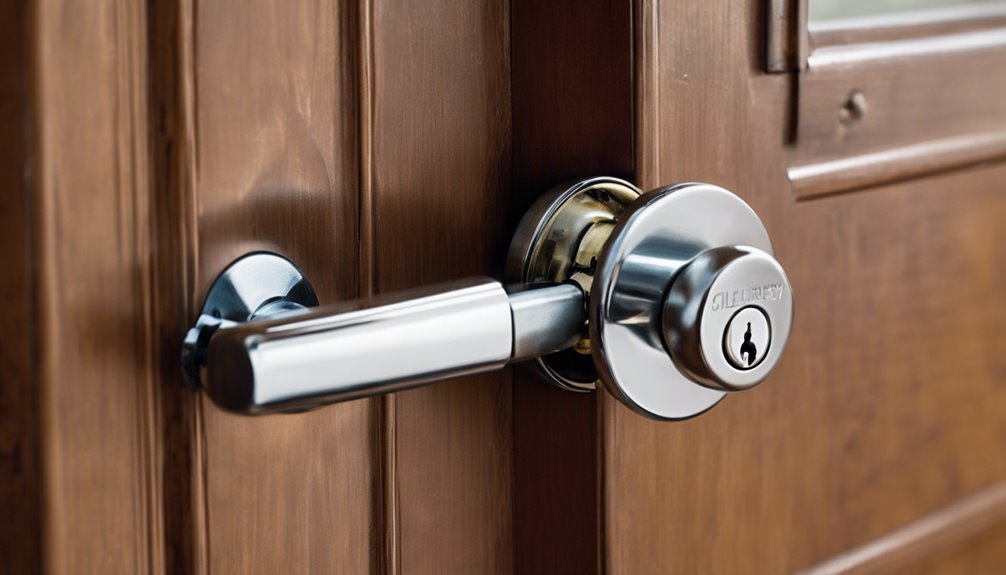
When considering the lock requirements for dwellings in New Jersey, it's crucial to adhere to specific standards designed to enhance security. Your entrance door must be equipped with a medium-duty dead-latching lockset, at least series 160 (FF-H-106c), paired with a minimum latch bolt of 11/16 inch by 1/2 inch, featuring a 1/2 inch throw and an automatic dead-locking plunger. Alternatively, you can opt for a separate deadbolt lock alongside the latch set. For added safety, a chain door guard is necessary for partial openings, and don't forget to install a viewing device for visual access outside. New Jersey law emphasizes that commercial locks must also adhere to these high-security standards to ensure optimal safety measures are in place. In New Jersey, there are specific laws that guide the process of changing locks, ensuring that both landlords and tenants are aware of their rights and responsibilities.
When managing building entrance and common areas, the regulations stipulate using heavy-duty dead-latching locksets, minimum series 161 (FF-H-106c). Exterior doors must have these locks to ensure higher security for multiple units. These doors require a minimum latch bolt size of 7/8 inch by 5/8 inch and, again, a 1/2 inch throw with an automatic dead-locking feature. Expect tenant-operated outside cylinders that shouldn't be keyed to dwelling units. Common areas must exhibit self-closing and self-locking mechanisms, possibly featuring an electronically operated buzzer or latch-release system for tenant ease. Exit and exitway doors should always be accessible from the inside without any hindrances. Adhering to these diverse standards can greatly elevate safety and security in your dwelling, affirming your freedom to live securely and comfortably.
Locking Devices for Windows
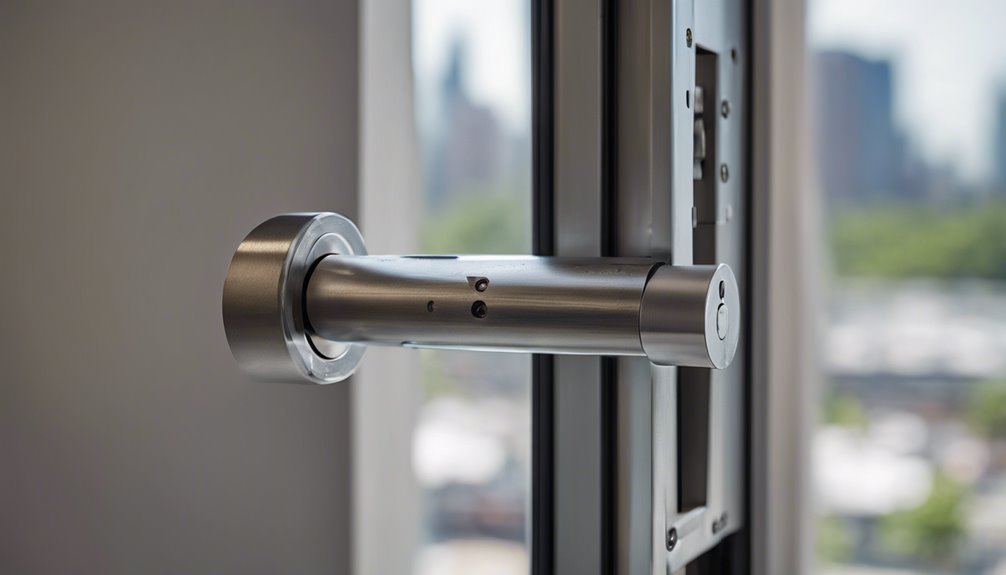
When securing your windows, understanding the specific locking devices that meet safety regulations is essential. In New Jersey, lock rekeying laws ensure that tenants have the right to request rekeying for security purposes, which can be crucial in preventing unauthorized access. You'll need to take into account both the types of locks available and how they comply with state requirements to guarantee not just security but also child safety. Businesses in New Jersey must also ensure that their locks comply with the Americans with Disabilities Act to provide accessible and safe environments for all individuals. Window guards are also recommended for residences with children to bolster safety measures further. Implementing appropriate locking mechanisms will help protect against unauthorized access while adhering to New Jersey's stringent codes.
Window Security Requirements
While securing windows might seem secondary to door locks, the significance of effective locking devices for windows can't be overstated, especially in residential settings. Compliance with New Jersey's window security requirements guarantees safety while maintaining residents' rights.
Here are key requirements to take into account:
- Installation: Window guards must be installed in apartments where children ten years old or younger reside, honoring written requests from tenants.
- Maintenance: Landlords are responsible for maintaining guards in good condition and informing residents of their rights to request installations.
- Egress Access: Guards on emergency egress windows must be removable from the inside without tools, guaranteeing safe escape routes in emergencies. Furthermore, screens must be provided in common and living areas to prevent insect entry, thus enhancing overall safety.
- State Compliance: All installations must adhere to the State Uniform Construction Code and not obstruct necessary egress. Locksmiths may be involved in the New Jersey eviction processes to ensure compliance with legal boundaries during such installations. It's important for locksmiths to be licensed in New Jersey to perform these duties legally and effectively.
Prohibited actions include tampering with or removing guards unless conditions are met, and landlords face liability if regulations aren't followed.
Types of Locking Devices
Effective window security isn't solely about installations and maintenance; it also hinges on the type of locking devices you choose. You've got several options, each tailored to different needs and window types.
Window pin locks are simple, affordable solutions that prevent windows from opening more than a certain amount. They're easy to install and often serve as supplementary locks.
If you have sliding windows, consider sliding window locks. These devices mount inside the window track to stop any movement, featuring levers or thumbscrews for effortless adjustments.
For enhanced security, keyed locks are robust choices, needing a key to operate. They're frequently paired with latch locks, offering added protection for single, double-hung, and sliding windows.
If you're interested in cutting-edge technology, look into smart locks and advanced mechanisms. Multipoint locking systems enhance security by engaging at multiple points along the window frame, and may even offer features like remote monitoring for peace of mind. In New Jersey, lock picking laws are critical for locksmiths to understand to ensure they are complying with legal standards.
Each device provides unique strengths, so carefully consider your options to guarantee your freedom is protected against unwanted intrusions. It's essential to note that in some areas, like New Jersey, key duplication laws dictate legal permissions and restrictions locksmiths must adhere to when duplicating keys.
Standards for Lock Hardware
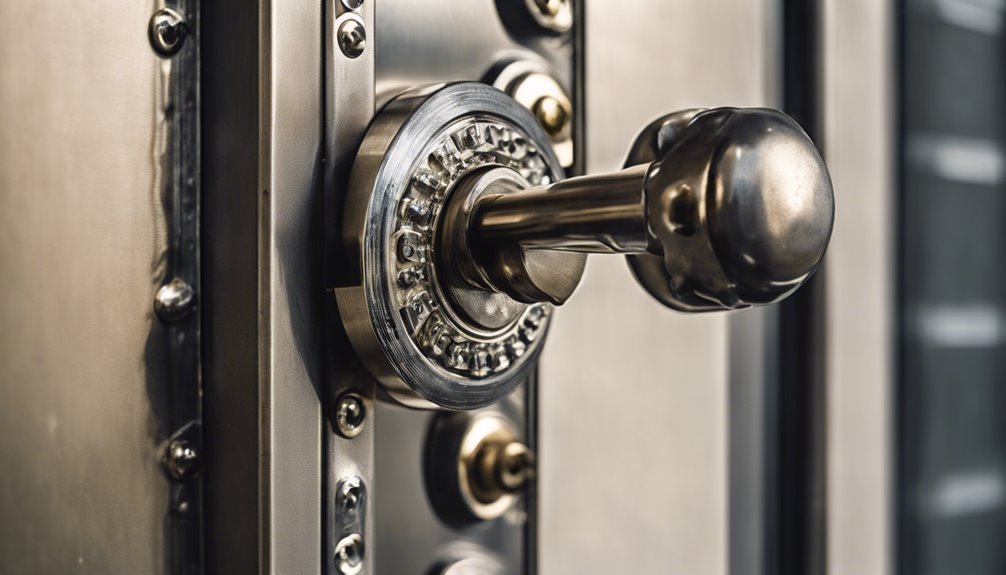
In New Jersey, understanding lock standards is essential for ensuring security in residential buildings. You'll find that each lock type has specific component specifications designed to meet stringent performance criteria, such as ANSI/BHMA grades. Regular maintenance and inspections are key to keeping these locks functional and compliant, preventing unauthorized access effectively. An important aspect to consider is that licensed locksmiths in New Jersey must adhere to state regulations, ensuring they are well-equipped to handle lock installations and repairs. To ensure security and comfort, New Jersey homeowners can rely on a nationwide 24-hour mobile locksmith service provider that guarantees satisfaction and expertise.
Lock Standards Overview
Lock standards in New Jersey are critical for safeguarding the safety and security of residential buildings, particularly regarding the type and grade of lock hardware used. Understanding these standards can empower you to make informed decisions about your property.
- Heavy duty locks (series 161, FF-H-106c, minimum) are required for building entrance and multi-unit exterior doors.
- Medium duty locks (series 160, FF-H-106c, minimum) are mandated for individual dwelling unit entrance doors.
- All locks must meet ANSI/BHMA A156.2 specifications: Grade 1 for heavy-duty locks and Grade 2 for medium-duty locks.
- Dead bolt locks can be utilized separately, should you opt for additional security.
Moreover, it's crucial to verify that tenant keys for main entrance doors aren't keyed to open dwelling unit doors, promoting a higher level of security.
Remember, all exit doors must allow free egress at all times for safety.
You also need to reflect on additional requirements, like the installation of viewing devices and self-closing mechanisms on exterior doors.
These standards not only enhance security but also contribute to a safer living environment. In addition to lock standards, locksmiths must adhere to employment laws in New Jersey, which include regulations on wages, working conditions, and rights to ensure fair and safe workplace environments.
Lock Component Specifications
When selecting lock hardware for both building entrances and dwelling units, it is essential to adhere to the specific component specifications mandated by New Jersey standards. Understanding these specifications guarantees a robust security infrastructure.
| Lock Type | Specifications | Compliance Standards |
|---|---|---|
| Building Entrances | Heavy duty dead latching locksets, min. 7/8" x 5/8", 1/2" throw latch bolt | ANSI/BHMA A156.2 Grade 1 |
| Automatic dead-locking plunger required | Series 161, FF-H-106c, min. | |
| Dwelling Units | Medium duty dead latching locksets, min. 11/16" x 1/2", 1/2" throw latch bolt | ANSI/BHMA A156.2 Grade 2 |
| Optional separate dead bolt lock | Series 160, FF-H-106c, min. | |
| Security Features | Self-closing and lockable exterior doors | Non-removable hinge pins required |
These specifications delineate necessary features for preventing unauthorized access and safeguarding safety. Proper implementation affirms the building's security as a priority while respecting the residents' need for privacy. Adhering to these regulations is significant not just for compliance but for creating a safer living environment.
Maintenance and Inspections
Guaranteeing the effectiveness of lock hardware hinges on regular maintenance and thorough inspections throughout the building's lifecycle. While specific maintenance schedules aren't outlined, it's imperative that locks remain operable and functional at all times, particularly for exit doors.
Here are four key considerations for maintaining and inspecting lock hardware:
- Regular Inspections: Include lock checks as part of overall building inspections to guarantee they meet safety standards.
- Compliance with Standards: Any renovation work must comply with the most current lock hardware standards to maintain security integrity.
- Functional Locks: Consistently verify that all locks are operational. Non-functional locks can compromise security, particularly in exitways.
- Documentation: Keep records of all inspections and maintenance activities for transparent compliance and to avoid potential legal consequences.
Adhering to the New Jersey Administrative Code and cooperating with local building departments guarantees that your lock hardware aligns with safety regulations.
Locksmith Licensing Requirements
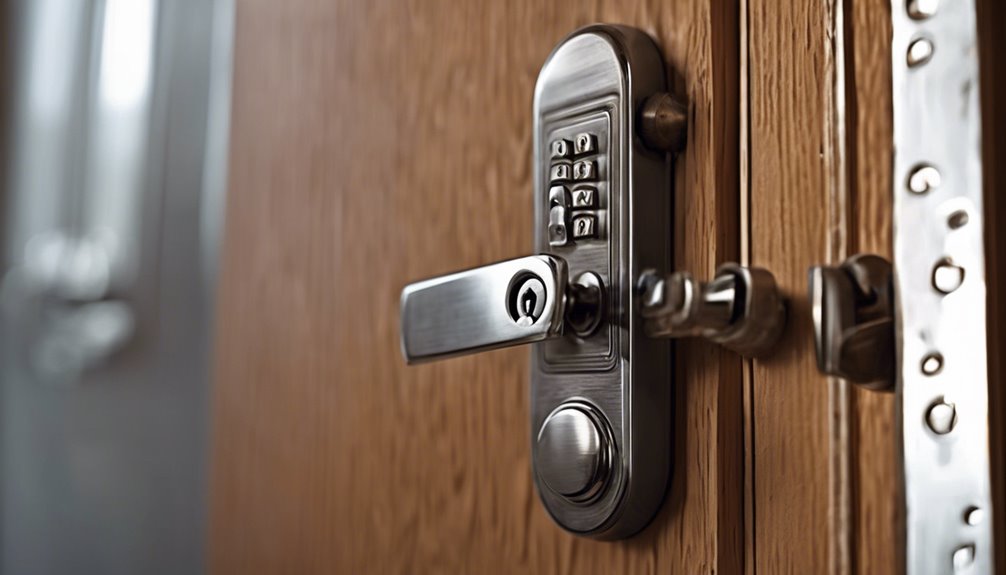
To become a licensed locksmith in New Jersey, you need to meet specific eligibility and educational requirements that guarantee competency and integrity in the profession. These requirements confirm you've got the necessary skills while maintaining a trustworthy reputation.
Here's a quick overview of the eligibility and educational criteria:
| Eligibility Criteria | Educational Requirements |
|---|---|
| At least 18 years old | Complete the locksmithing examination |
| Good moral character | Two hours of training in Barrier Free Subcode |
| No serious criminal convictions | Two hours of training in New Jersey Uniform Code |
| High school diploma or equivalent | Two hours of training in ADA Code |
| Background check with fingerprints | Two hours of training in industrial safety |
You'll need to submit an application, which can be done online or downloaded from the Committee's website. A non-refundable fee of $150 applies. The Fire Alarm, Burglar Alarm, and Locksmith Advisory Committee manages the licensing process, confirming all applicants meet the regulatory standards.
Having completed these requirements allows you to obtain a license valid for three years, which then needs to be renewed. Following these procedures not only enhances your qualifications but also contributes to establishing a secure framework for the locksmithing industry in New Jersey.
Training and Apprenticeship Paths

As you explore the training and apprenticeship paths available for aspiring locksmiths in New Jersey, you'll find a variety of options designed to equip you with the necessary skills and knowledge. These programs are essential for mastering both theoretical concepts and practical skills important for a successful locksmithing career.
Here are some key features of these training paths:
- Diverse Training Options: You can choose from community colleges, vocational schools, or locksmith trade associations, with formats including online courses and classroom instruction.
- Safety and Codes Training: It's critical to complete specific courses related to safety standards, including the New Jersey Uniform Construction Code and the Americans with Disabilities Act Code.
- Apprenticeship Programs: Generally lasting around two years, these programs blend on-the-job training with classroom learning. You'll work closely under the guidance of experienced locksmiths at local companies.
- Certification Opportunities: While not mandatory, obtaining certifications from recognized bodies enhances your credibility. These programs often require continuing education to keep you updated in the field.
To qualify for locksmith licensing, you'll need either 3 years of relevant experience or to complete a 2-year apprenticeship. This hands-on experience is fundamental, as it guarantees you develop the problem-solving and technical skills necessary for the industry.
Taking these paths not only fosters your growth but also positions you competitively in a dynamic market.
Compliance and Enforcement Measures

While locksmiths play an essential role in maintaining security, compliance with lock specifications and enforcement measures in New Jersey is non-negotiable. Adhering to specific standards guarantees that building and dwelling unit entrance doors are equipped with high-quality locking mechanisms, like heavy-duty dead-latching locksets for buildings and medium-duty sets for dwelling units. These requirements include precise latch bolt dimensions and mandatory features such as automatic dead-locking mechanisms.
As a locksmith, you must be aware of your responsibilities for lock installation and maintenance. All exterior doors should be self-closing and lockable, while exit doors must remain freely openable from the inside. Additionally, every operable window and sliding door must have adequate locking devices in place.
To operate legally, you need a locksmith's license, which entails passing a rigorous examination, a criminal background check, and adherence to specific educational requirements. Each aspect underscores your commitment to maintaining high-security standards.
Regular inspections guarantee compliance with enforced regulations. Although the exact frequency of these inspections may not be defined, you can face penalties for non-compliance, including fines or legal actions that might require court mandates to rectify downfalls.
If you neglect these standards, you risk not only penalties but also the potential loss of your license to operate as a locksmith in New Jersey.
Frequently Asked Questions
What Are the Penalties for Violating Lock Standards in New Jersey?
If you violate lock standards, you could face substantial penalties.
Depending on the severity, fines may reach up to $500 per day, escalating to $5,000 for more serious offenses.
Imminent hazards might even result in punitive closure.
Compliance is essential, as local agencies will issue orders for abatement, and failure to comply could trigger further enforcement actions.
Ignoring regulations can't only lead to fines but also suspension of licenses or court actions.
How Can Tenants Report Lock Compliance Issues Effectively?
To report lock compliance issues effectively, document the problem in writing, clearly stating your concerns and the necessary repairs.
Give your landlord reasonable notice for access, typically one day.
Take photographs to support your claims.
If your landlord doesn't address the issue, contact your city's code enforcement office for an inspection.
This documentation can help if you need to pursue further action, ensuring your right to safe housing is upheld.
Are There Specific Regulations for High-Security Locks?
When it comes to guaranteeing your safety and peace of mind, high-security locks are essential.
While specific regulations can vary by area, you'll typically find that these locks must meet stringent industry standards.
Features like hardened steel, pick resistance, and drill-proof mechanisms are common.
If you're looking to secure maximum security for your home, pay attention to these specifications.
They not only enhance protection but allow you the freedom to feel safe in your space.
What Is the Process for Appealing a Locksmith Licensing Decision?
To appeal a locksmith licensing decision, you've got 45 days from receiving the notice.
Focus on legal errors in your case, not just dissatisfaction with the outcome.
Gather your completed appeal forms, the final judgment, and any pertinent legal research.
File a motion for leave to appeal if needed, and guarantee you meet court rules for documentation and submission.
Keep in mind the associated costs for filing and transcripts.
Can Landlords Install Their Own Locks Without Professional Help?
Imagine standing at the threshold of your property, ready to fortify it. You can install your own locks without professional help, but you've got to verify they meet specific standards.
Think of each lock as a shield – if misaligned, it can weaken your defense. While it's feasible for you to change them yourself, consulting a locksmith might save you from headaches later by ensuring compliance and security.
Protect your space wisely!
Conclusion
In short, adhering to New Jersey's high-security lock standards isn't just a legal obligation—it's your best line of defense against potential threats. By ensuring your locks meet stringent requirements and working with licensed locksmiths, you're fortifying your sanctuary. Just as a sturdy fortress stands strong against invaders, so too can you secure your home or business. Stay informed, stay compliant, and transform your property into a haven of safety where peace of mind reigns supreme.

